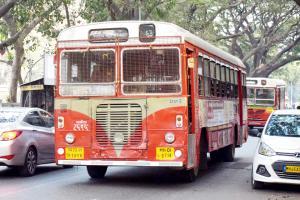For Mumbai's bus service to survive, the BMC must rise above partisan politics and invest capital and attention in it

BEST needs to seriously overhaul its operations if it has to stay afloat and relevant. File pic
A nine-day strike by Brihanmumbai Electric Supply and Transport (BEST) employees in January cost the operator up to Rs 20 crore and inconvenienced nearly 25 lakh commuters. Its timing coincided with the operator running out of the R1,600-crore loan it received from the Brihanmumbai Municipal Corporation (BMC) in 2012. The strike was called off following a high court directive to provide a 10-step salary hike to the employees. While this measure has offered interim relief, there is little clarity on how Mumbai's only bus service plans to solve its financial challenges and stay on track.
ADVERTISEMENT
Today, four primary narratives surround BEST:
Loss making: In 2016, the financially-strapped BEST commissioned PricewaterhouseCoopers (PwC), a global financial consulting firm, and Aakar Architects and Consultants (AAC), to undertake a study on commercial development of its bus depots, stations and staff quarters. PwC's report suggested that BEST could exploit 30-50 per cent of its plots to earn a revenue over R3,000 crore. We have seen Mahim depot developed and others are in discussion. Despite such measures to keep afloat, the bus service struggles to survive. The BMC has an overall budget of R27,000 crore and a road maintenance budget of R2,000 crore. At a time when cities the world over are looking at bus-based transport to reduce pollution and congestion, it would seem reasonable that the BMC allocates about R750-800 crore to run the bus service.
Falling ridership: BEST has a fleet size of over 3,000 buses. But over the years, the bus service has suffered due to unplanned urbanisation. In the suburbs, BEST has been unable to compete with auto rickshaws, which are compact, cost-effective and easy to manoeuvre in traffic. Around railway stations, high pedestrian footfall and unruly rickshaw movement hinders navigation. On long routes, peak-hours speed has reduced to less than 10 km/hr. The result: despite mass ridership, passengers have declined by about 40 per cent since 2007.
Inefficient operations: At a time when transport enterprises, including auto rickshaws, are allowing free access to their data and offering facilities such as online seat booking, easy fare collection, trip planning and route navigation, BEST does not share GPS data. On the contrary, it has regressed: recently, BEST's fare collection contract expired, pushing them back to issuing paper tickets. BEST needs to open-up its data and incorporate technological advancement to be competitive.
Underpaid drivers and conductors: BEST staff wants be placed in the Grade 4 category of the BMC workers, entitled to R22,000 per month. Given the stressful nature of plying on Mumbai's roads, this ask seems reasonable. Today, auto rickshaw and taxi aggregators have crowded the market with their services, leading to massive disparity across the sector. To tackle such issues, the city must rise above partisan politics and take specific measures, like disallowing private services from cutting into BEST's share.
BEST also needs to take some brisk action:
1. Depots and terminals are critical for a bus system. Commercial development in these spaces should be undertaken only after safeguarding the efficiency of the operations. They should be fully utilised by BEST and two new terminals should be established in Central Mumbai to meet the footfall.
2. Bus priority lanes, bus-only one-ways, right turns, special signals during peak hour and other such systems prevalent till the '90s, should be reintroduced.
3. BEST employees should be made an integral part of the BMC and the operator allocated an annual fund.
4. Capital must be invested upgrade BEST's technology. Data should be harnessed and used to plan, manage and improve operations regularly. To reinvent BEST, the BMC must overcome partisan politics, multiplicity of institutions, people and finance-related challenges. A senior administrative officer should be appointed to lead BEST. Stringent measures and a strong political will is the need of the hour.
Madhav Pai is director, WRI India Ross Center for Sustainable Cities
Catch up on all the latest Crime, National, International and Hatke news here. Also download the new mid-day Android and iOS apps to get latest updates
 Subscribe today by clicking the link and stay updated with the latest news!" Click here!
Subscribe today by clicking the link and stay updated with the latest news!" Click here!






